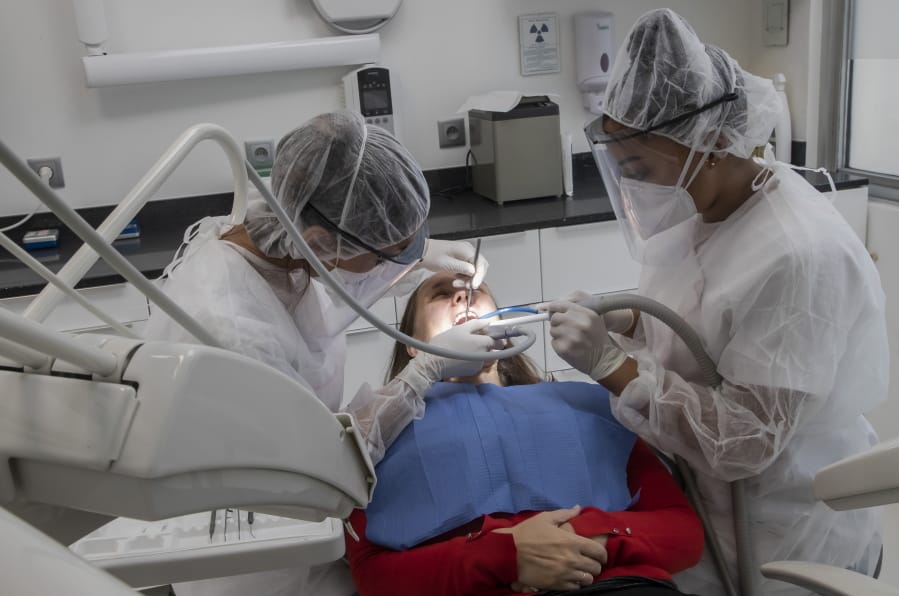PARIS — Anyone who suffered through France’s two-month lockdown with a toothache or other oral affliction of a non-emergency nature has a hope of licking the pain.
Dental practices around the country are cautiously reopening and accepting appointments after the French government eased restrictions on some businesses, services and public activity.
Yet getting back to work in the age of coronavirus requires caution, especially for over 40,000 dentists in France who are among the health professionals at highest risk of becoming infected.
Because respiratory droplets are a way the virus spreads among people, dentistry demands protecting patients and especially practitioners. That means not only disinfecting tools and surfaces, but layer upon layer of extra screens, wraps, gloves and masks.
The World Health Organization has recommended specialized face masks for health care providers performing medical procedures such as ventilation and intubation that produce fine, airborne particles, which might transmit the coronavirus. Drilling teeth for fillings is also known to generate aerosolized viral particles.
Paris dentist Sabrine Jendoubi said the trade-off for safety is the discomfort of additional head and body wear.
“A surgical suit is something that we wear in the operating theater. Today, we wear it for everything.” Jendoubi said. Of the various filtering face masks certified to protect against viruses in the air, she finds the FFP2-rated model “the most complicated, as it’s really tight.”
“It filters out every virus and bacteria, so it’s quite heavy to wear but it protects us and the patients,” Jendoubi said.
The additional precautions are also an added expense. An operator of medical clinics and offices in France, Doctocare, told the AP it is costing 50,000 euros ($54,000) to supply each of the company’s centers with the hygiene and protective equipment recommended by the French government.
“We will communicate to the government these difficult adjustments in terms of profitability, but for now we’re focused on this public health issue,” Carine Benharrous, director of dental operations at Doctocare, said.
The limited distance between the faces of dentists and their patients also is a potential concern, as some experts have theorized that people who get a bigger infectious dose of the coronavirus may become more seriously ill with COVID-19.
In Britain, all routine dental care has been suspended except for telephone consultations and prescriptions.
While dentists in Denmark are returning to their offices, they are wearing protective suits and plastic face shields while tending to patients lying with their mouths wide open. Cleaning teeth to remove plaque is being done by hand instead of with ultrasonic devices that would increase the risk of producing spit.
Yet in some European countries, dental practices never closed because of the virus. Dentists in Italy, one of the nations hit hardest by infections and virus-related deaths, reduced their services to take only urgent cases in person, managing other patients by telephone.
Proof that a pandemic wasn’t an excuse to avoid an Italian dentist chair was an April 23 photo on Twitter of U.S. Ambassador to the Holy See Callista Gingrich wearing a protective hairnet and paper drape.
“A trip to the dentist in Italy during the COVID-19 pandemic,” Gingrich tweeted with emoji of an Italian flag and smiley face in sunglasses.
Adamson reported from Leeds, England. Jan Olsen in Copenhagen, Nicole Winfield in Rome and Maria Cheng in London contributed.



